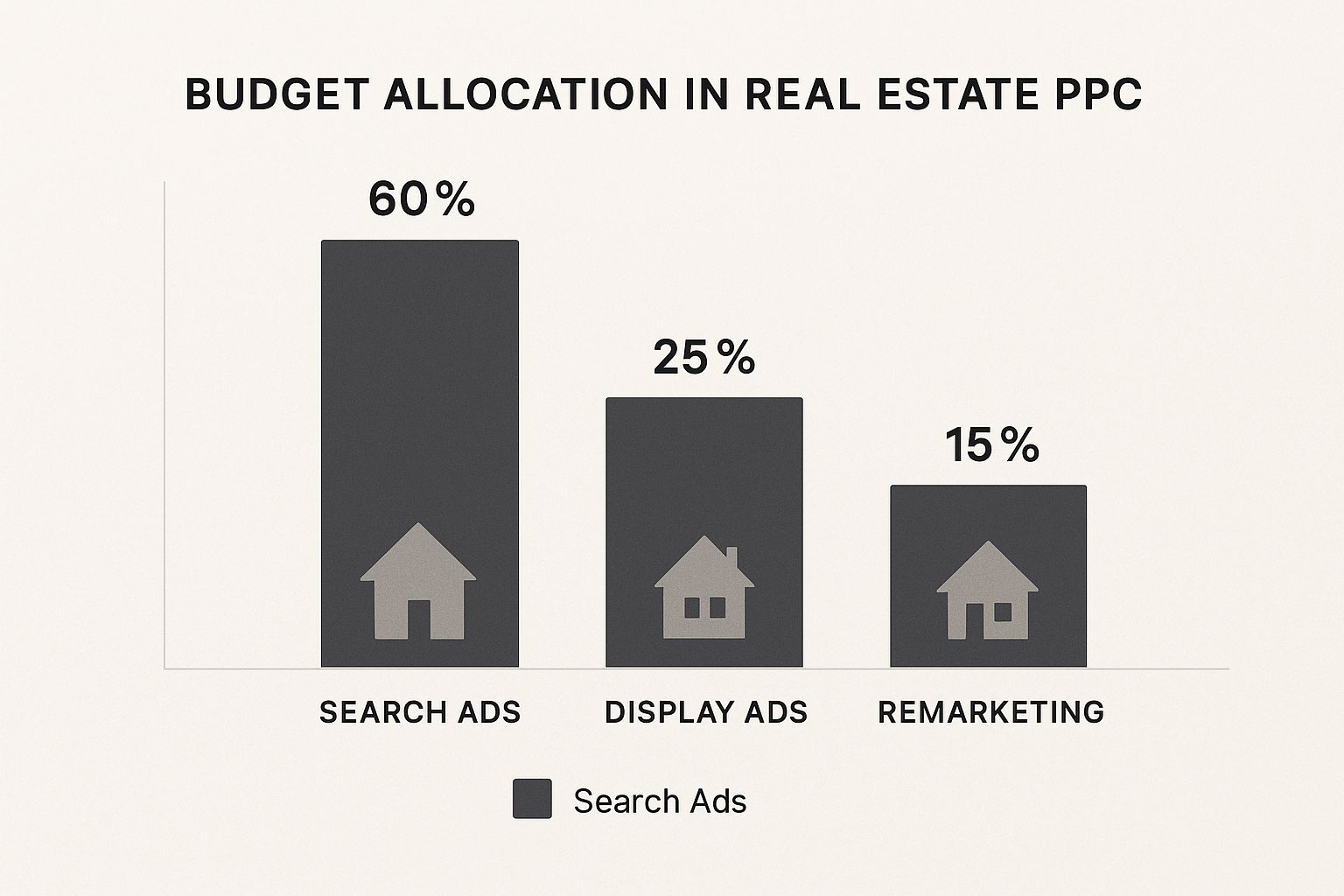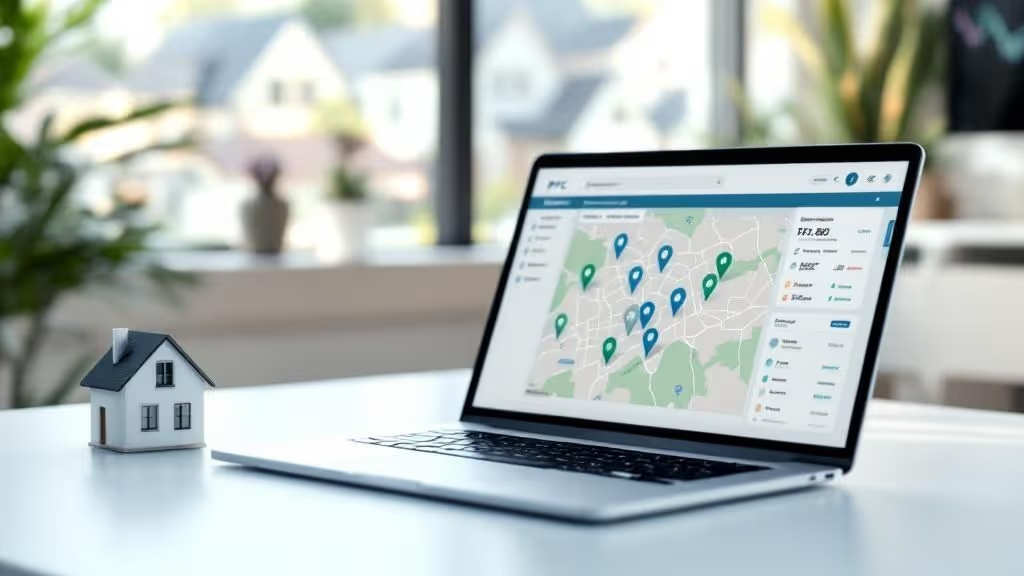Real estate PPC is about placing your brand in front of motivated buyers and sellers the moment they begin their online search. Unlike organic strategies that can take months to yield results, Pay-Per-Click (PPC) advertising allows you to place targeted ads on search engines and pay only when someone clicks. This gives you immediate visibility in the specific markets you aim to capture.
Why PPC Is a Game Changer for Real Estate Agents

In a competitive property market, speed and precision are paramount. While SEO is vital for long-term authority, real estate PPC advertising delivers the immediate impact needed to generate leads now. It provides a direct connection to individuals actively searching for homes or agents.
Imagine a potential seller typing "best real estate agent in downtown Denver" into Google. With a well-crafted PPC campaign, your agency can appear at the top of the search results—not in six months, but within hours of launch. This approach allows for instant penetration into specific zip codes and neighborhoods on demand, moving beyond simple lead generation.
Compete with Established Players Instantly
Newer agents and boutique brokerages often struggle to compete with the extensive online presence of larger firms. PPC levels this playing field. Success isn't determined by the age of a website but by the intelligence of the strategy. A well-allocated budget combined with precise targeting enables you to bypass the long wait for organic ranking and gain visibility from day one.
The level of control is remarkable. You can configure ads to appear only to users searching for "four-bedroom homes near Central Park" on their mobile devices or target homeowners in a specific subdivision who may be considering selling. This ensures that every dollar spent is directed toward reaching genuinely interested prospects.
The real magic of PPC is its immediacy. SEO is a marathon, and you should absolutely be running it. But PPC is the sprint that gets you quick wins and valuable data to fuel your entire marketing engine.
Capitalize on High User Intent
The data underscores the power of this channel. Real estate ads on Google Search currently achieve an average click-through rate (CTR) of 6.19%, significantly outperforming the 0.59% CTR for display ads.
Furthermore, these search campaigns boast a 4.50% conversion rate. When compared to the cross-industry average of just 2.70%, it's clear how effective this channel is for real estate professionals. This data confirms that users clicking on real estate search ads are highly motivated and more likely to take the next step, whether it's completing a "What's My Home Worth?" form or making a direct call.
PPC vs. Other Real Estate Marketing Channels
To provide a clear perspective, here is a comparison of PPC against other common marketing channels.
While a balanced strategy is always optimal, this highlights why PPC is the preferred choice for agents needing to generate leads and see a rapid return on investment.
Understanding PPC's role is crucial for any business focused on rapid growth. The principles of immediate, targeted visibility extend far beyond real estate. To explore this topic further, consider our guide on why PPC is important for your organization. By integrating PPC into your marketing toolkit, you transition from passively waiting for clients to actively engaging them at their moment of need.
Nailing Your Keyword Strategy: The Foundation of PPC Success
The success of your real estate PPC advertising campaign hinges on your keyword selection. A flawed strategy, such as bidding on broad terms like "homes for sale," will quickly deplete your budget on unqualified traffic.
The most effective approach involves targeting high-intent, long-tail keywords. These longer, more specific phrases reveal precisely what a user is looking for. It's the difference between someone vaguely searching for "houses" and a motivated buyer asking, "Where can I find a four-bedroom home with a pool in Scottsdale, AZ?" The latter is clearly a more serious prospect.
Getting Inside the Head of Buyers and Sellers
To begin, you must adopt the mindset of your clients. What specific phrases would a motivated buyer or seller use on Google? Map out their thought process. A first-time homebuyer's search queries will differ significantly from those of someone selling a luxury estate.
Segment your keywords into distinct categories. This not only aids in organization but also enables you to create highly relevant ads for each group.
- Buyer Keywords: These typically combine location with property details, such as "waterfront condos in Miami Beach" or "new construction townhomes near Austin."
- Seller Keywords: These focus on home valuation and agent selection, including phrases like "what is my home worth in Denver" or "best real estate agents in La Jolla."
- Branded Keywords: This involves bidding on your own name or your brokerage's name. It's a defensive strategy to prevent competitors from placing ads above your organic search results when someone is looking for you specifically.
By separating these keyword types, you can craft ads that speak directly to each audience, which helps improve your Quality Score and can lead to lower advertising costs.
The Power of Long-Tail Keywords
Long-tail keywords are the cornerstone of a sophisticated real estate PPC campaign. While they have lower individual search volumes, the users searching for them are much closer to making a decision, which translates directly into higher conversion rates.
Consider this example:
- Broad & Vague: "Dallas real estate"
- Specific & Actionable: "modern farmhouse for sale in North Dallas ISD"
The first searcher is likely browsing casually, while the second is a buyer with clear intentions. By targeting these detailed phrases, you filter out irrelevant traffic and connect with individuals ready to transact. Think in terms of specific neighborhoods, school districts, property features, and architectural styles.
Focusing on long-tail keywords means you're not just buying clicks; you're investing in conversations with people who are actively looking to transact. It’s the difference between casting a wide, empty net and using a perfectly baited hook.
The Financial Side of Keyword Bidding
Effective budget planning requires an understanding of the costs involved. The real estate keyword market is competitive, but a smart strategy can navigate it successfully. On Google Search, the average cost per click (CPC) for real estate ads is approximately $2.37.
However, the ultimate goal is generating leads, not just clicks. The average cost per lead (CPL) for real estate PPC typically falls between $30 and $60, with search advertising averaging around $66.02 per lead. You can explore these figures in more detail with recent real estate PPC budget insights for 2025. This data reinforces the importance of a precise, intent-focused keyword strategy to ensure your ad spend translates into actual clients.
Building Your Negative Keyword Fortress
The keywords you exclude are just as critical as those you target. A negative keyword list is an indispensable component of any professional campaign. It acts as a shield, preventing your ads from appearing in irrelevant searches that waste your budget.
Without a robust negative list, your ad for "luxury homes for sale" could be triggered by a search for "luxury home design jobs." This results in a wasted click and a lost opportunity.
Start with a basic list and continuously expand it. Here are a few essential categories:
- Rentals: rent, apartment, for rent, lease
- Careers: jobs, careers, agent training, real estate school
- DIY/Info Seekers: zillow, redfin, trulia, templates, free forms
- Wrong Locations: Any cities, states, or neighborhoods you do not serve.
Regularly review your search terms report in Google Ads. This report reveals the exact queries that triggered your ads. If you find an irrelevant term, add it to your negative list immediately. This ongoing process of refining your targeting will protect your budget and ensure you only pay for clicks with a genuine chance of converting into a commission.
Writing Ad Copy That Converts Clicks into Clients

With your keyword research complete, the next critical step is writing compelling ad copy. This is where you convert interest into action. Even with the best keywords, ineffective ad copy will lead to wasted clicks and poor results.
Your ad serves as a promise. You have only a few seconds to convince a user that clicking your link is their best course of action. Every word must be impactful.
The Anatomy of a High-Performing Real Estate Ad
An effective ad is a well-engineered machine. The most successful ads consistently incorporate three key elements: a strong headline, a descriptive body, and a clear call-to-action (CTA).
The Headline: This is your hook. It must grab attention and mirror the user's search query. If someone searches "four-bedroom homes in Scottsdale," a headline like "Scottsdale 4-Bed Homes for Sale" confirms they are in the right place.
The Description: This is where you provide value. Instead of merely listing features, sell the benefits. "See Listings" is generic; "View Exclusive Listings Updated Daily" creates a sense of urgency and value. Use this space to build trust and set expectations for your landing page.
The Call-to-Action (CTA): Be direct and tell users exactly what you want them to do. Vague CTAs like "Learn More" are often ignored. Use strong, action-oriented phrases such as "Get Your Free Home Valuation" or "Browse New Homes Now."
Tailoring Your Message for Different Audiences
A one-size-fits-all ad is a recipe for failure. Your copy must resonate with the specific needs and concerns of your target audience. A first-time buyer has different priorities than a luxury seller, and your messaging should reflect that understanding.
Here are two practical examples:
Ad Copy for a First-Time Homebuyer:
- Headline: Stop Renting | Find Your First Home
- Description: Easy Financing Options. See Homes Under $400k. Get Expert Guidance & Down Payment Assistance Info.
- Why it works: It addresses their primary motivation (to stop renting) and immediately speaks to their main concerns: affordability, financing, and the need for expert guidance.
Ad Copy for a Luxury Seller:
- Headline: What's Your Luxury Property Worth?
- Description: Get a Confidential & Accurate Valuation from Our Luxury Market Experts. Proven Marketing for High-End Homes.
- Why it works: It employs language that appeals to a high-end client. Words like "confidential," "expert," and "proven" establish credibility and cater to their desire for discretion and premium service.
Your ad copy must be a direct answer to the unasked questions in a searcher's mind. For buyers, it’s “Can I afford this?” For sellers, it’s “Can you get me the best price?” Answering these questions builds immediate rapport and drives action.
Supercharge Your Ads with Extensions
Ad extensions are a simple, free way to enhance your ads and are an essential tool in any serious real estate PPC advertising campaign.
Extensions add valuable information and links below your main ad, increasing its size on the search results page and providing more reasons for users to click your ad over a competitor's. They can significantly boost your click-through rate.
Here are the most effective extensions to use:
- Sitelink Extensions: These provide direct links to specific pages on your website, such as "Featured Neighborhoods," "New Listings," or your "About Us" page.
- Call Extensions: This places your phone number directly in the ad, creating a click-to-call button on mobile devices—ideal for capturing leads who are ready to speak immediately.
- Location Extensions: Display your office address and a map marker to build local credibility and make it easy for potential clients to find you.
- Image Extensions: Real estate is highly visual. Adding compelling photos of properties or a professional headshot can capture attention and stop users from scrolling.
By combining powerful copy with the strategic use of ad extensions, you create an ad that is not just visible but also compelling and difficult to ignore. You deliver significant value even before the click, setting the stage for a successful conversion.
Optimizing Your Funnel from Click to Conversion
https://www.youtube.com/embed/LJmE4YexCUQ
Getting the click is just the first step. The critical moment in real estate PPC advertising is what happens after the click. This is where you convert a curious browser into a qualified lead, and it is where many agents falter.
Your ad makes a promise, and your landing page must deliver on it instantly. A disconnect between your ad copy and the landing page experience will not only lose a potential client but also waste your advertising budget.
Go Beyond Basic Targeting
While keyword targeting is fundamental, advanced audience layering distinguishes professional campaigns. Google Ads offers powerful tools to refine your targeting based on location, demographics, and online behavior, adding a layer of intelligence to your keyword strategy.
For instance, geofencing allows you to target users within a very small radius, such as a specific subdivision or around a new luxury condo building. Imagine running "Just Listed" ads that are only visible to people physically present in that neighborhood. This tactic can be a game-changer.
Another effective strategy is targeting in-market audiences. These are users Google has identified as actively shopping for a home based on their recent searches and site visits. By applying this audience layer, you focus your budget on individuals who are much closer to making a decision.
The Cardinal Sin of PPC: Sending Traffic to Your Homepage
Sending paid traffic from a highly specific ad to your generic homepage is one of the costliest mistakes you can make. Your homepage is designed for general browsing and contains numerous distractions irrelevant to a user who clicked an ad for "waterfront homes in Miami." This leads to frustration and a high bounce rate.
Every single ad campaign needs its own dedicated landing page. This isn't a friendly suggestion; it’s a non-negotiable rule if you want to maximize your ad spend. A dedicated page continues the focused conversation you started with your ad, leading the user toward one specific action.
A purpose-built landing page eliminates all distractions like navigation bars, blog links, and agent bios. It focuses solely on the value promised in the ad and provides a clear path to conversion. This singular focus dramatically increases your chances of capturing a lead. While landing page strategy is universal, seeing it applied in other competitive fields can offer fresh ideas. For another perspective, check out our guide on how to run Google Ads for MSP services, where this same focused approach is critical for success.
Blueprint for a High-Converting Real Estate Landing Page
A winning landing page follows a simple, psychologically-backed formula designed to build trust and drive action quickly.
Here is an excellent example of a clean, focused real estate landing page designed for lead capture.
Note the absence of distracting navigation. It features a single, clear headline, a simple form, and trust signals to reassure the visitor.
These are the non-negotiable elements you need:
- A Powerful, Matching Headline: Your landing page headline must directly reflect the ad's promise. If the ad says, "Get a Free Home Valuation," the headline should be something like, "Find Out Your Home's True Value in 60 Seconds."
- Compelling Visuals: Use high-quality photos or a short video of the property type or local area.
- Trust-Building Elements: This is crucial. Add client testimonials, logos from associations like NAR, or any awards you've won to build instant credibility.
- A Simple Lead Capture Form: Only request essential information to start the conversation—typically name, email, and phone number. A lengthy form will drastically reduce your conversion rate.
- A Clear Call-to-Action (CTA) Button: Use action-oriented text on your button. "Get My Free Valuation" is far more effective than a passive "Submit."
Don't Forget Mobile Optimization
Mobile optimization is no longer a trend; it's the standard. In real estate, mobile devices now account for 52% of all PPC clicks. You can dive deeper into these paid media trends on DesignRush.com.
The implication is clear: if your landing page is slow, clunky, or difficult to use on a smartphone, you are willingly losing more than half of your potential leads. Every element, from forms and buttons to text, must be optimized for small screens to ensure a seamless user experience.
How to Measure and Maximize Your PPC ROI
Running a real estate PPC campaign without tracking key metrics is like selling a house without knowing its value. To transform your ad spend into a predictable lead-generation machine, you must focus on what truly matters: your bottom line.
The ultimate goal is a positive Return on Investment (ROI). This requires moving beyond surface-level metrics like clicks and connecting your ad spend directly to closed deals. A good CRM is essential for this, as it helps you identify which ads and keywords are generating not just leads, but actual commissions.
A balanced budget is crucial. The majority of your investment should target active, high-intent prospects, while a smaller portion can be dedicated to re-engaging people who have already shown interest.

As shown, a typical strategy allocates a significant portion to Search Ads (60%) to capture active searchers. Display Ads receive about 25% for brand awareness, and a critical 15% is dedicated to Remarketing to re-engage past visitors.
Setting Up Bulletproof Conversion Tracking
Before you can measure meaningful results, you must implement flawless conversion tracking. This is the absolute foundation of your ROI calculation. Without it, you are essentially guessing.
In real estate, a conversion is any valuable action a user takes after clicking your ad. We primarily focus on two types:
- Form Submissions: When a prospect completes a "Contact Us," "Get a Free Home Valuation," or "Schedule a Tour" form.
- Phone Calls: When someone clicks a call extension or the number on your website to call you directly.
Tracking both is essential. Google Ads simplifies this process. You can track form submissions by placing a tracking code on the "Thank You" page that appears after a user submits their information. For phone calls, Google's call forwarding numbers dynamically replace your business number, allowing you to track every call originating from your ads.
Key Metrics That Define Success in Real Estate
With tracking in place, you can shift your focus from vanity metrics to the numbers that truly drive your business. The table below outlines the essential metrics for any real estate PPC campaign.
Key PPC Performance Metrics for Real Estate Agents
These metrics provide a complete picture of your campaign's health. While clicks bring people to your site, CPL measures the cost of acquisition, and ROAS determines the overall profitability of your efforts.
Clicks tell you your ad is being seen. Conversions tell you your ad is working. ROAS tells you your ad is making you money. Focus on the money.
Actionable Tactics for Optimizing ROI
With reliable data from your conversion tracking, you can begin making intelligent adjustments to boost your campaign's performance. This is an ongoing process of refinement, not a one-time setup.
A/B Test Your Ad Copy and Landing Pages
Never assume your initial draft is optimal. Continuous testing is the only way to determine what truly works.
- Test your headlines. Create two nearly identical ads, changing only the headline. For example, test "Find Your Dream Home in [City]" against the more urgent "New [City] Listings Added Daily." Run both and let the data reveal which one generates more clicks and, more importantly, conversions.
- Experiment with calls-to-action (CTAs). On your landing page, does "See All Available Homes" perform better than "Search MLS Listings"? A subtle change in wording can have a significant impact on user action.
Refine Bids Based on Performance
Treat your keywords differently based on their performance. Some will be lead-generating superstars, while others will drain your budget.
- Increase bids on keywords with a high conversion rate and a healthy CPL. These are your most profitable terms, so you want to maximize their visibility.
- Lower your bids or pause keywords that receive many clicks but generate no conversions. They are attracting the wrong audience and wasting your ad spend.
By consistently monitoring these core metrics and making data-driven decisions, you can transform your real estate PPC advertising from a marketing expense into a predictable and scalable source of high-quality leads.
Your Top Real Estate PPC Questions, Answered

Even with a well-devised plan, questions will inevitably arise when running PPC campaigns. Based on my experience with countless agents, here are straightforward answers to some of the most common inquiries.
How Much Should a Real Estate Agent Spend on PPC?
A realistic starting point is a budget between $500 and $1,000 per month. This amount is sufficient to gather meaningful data and identify effective strategies without a significant financial commitment.
A more strategic approach is to work backward from your revenue goals. Determine how many leads you need to close a deal, calculate your average Cost Per Lead (CPL), and set a budget that aligns with your commission targets. I always recommend starting small, proving the ROI, and then scaling your investment with confidence.
How Long Until I See Results from My Ads?
This is where PPC truly excels. You can see traffic and impressions almost immediately—often within hours of launching your campaign. However, converting that initial traffic into a consistent flow of high-quality leads requires more time.
Plan for a 90-day window. This period allows you to collect sufficient performance data, test your ad copy and landing pages, and build a comprehensive negative keyword list. You will learn which keywords are wasting your budget and which are driving valuable conversions.
Don't panic and pull the plug after a week of so-so results. Real success comes from the small, consistent optimizations you make over those first three months. That’s how you build a predictable lead machine.
Should I Use Google Ads or Facebook Ads?
The honest answer is that you should probably use both. They are not competitors; they are complementary platforms.
Google Ads is designed to capture intent. You target users who are actively searching for terms like "homes for sale in [your city]." These individuals are ready to act, making Google Ads the premier platform for generating high-quality leads with a clear path to ROI.
Facebook Ads is for creating demand. You target users based on their demographics, interests, and online behavior, allowing you to reach potential clients before they even begin their search. It is excellent for building brand awareness, showcasing new listings, and nurturing long-term leads.
If you must choose one to start, begin with Google Ads. Capturing existing demand is the fastest way to achieve a return on your investment.
Can Running PPC Ads Hurt My SEO?
This is a common myth, but the answer is a firm no. PPC and SEO are distinct marketing channels, and one does not negatively impact the other. In fact, when used in concert, they can create powerful synergies.
Your PPC data provides direct insight into what your audience wants. You can see which keywords are converting into leads and then use those proven terms to inform your SEO content strategy. This integrated approach is far more effective. It's crucial to avoid common pitfalls in both areas; learn more about the common SEO mistakes to avoid to maintain a strong overall digital strategy. A well-executed PPC campaign enhances brand recognition and drives more traffic to your site—both positive signals for your SEO efforts.





